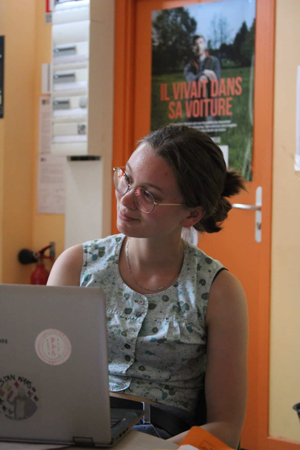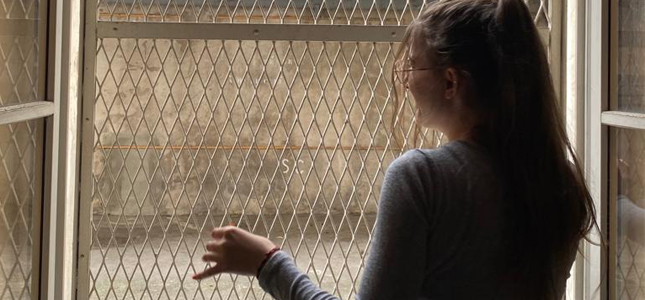When she arrived in France, she met several conditions for obtaining UNAM status: she is a girl, a minor, alone, and ill. She suffers from Blapharophimosis-Ptosis-Epicathus inversus (BPES), a rare genetic condition that deforms her eyes. Despite this, she had to fight for 4 years to obtain her papers.
By Oriel Wagner, student at Science Po, Nancy. Editor Elda Spaho Bleta

"I am a very determined person. If I want something, I get it." Kaltrina's* eyes, as always adorned with a sharp line of eyeliner, shine with determination. And yet, obtaining the right to stay in France was anything but easy for her. On the eve of the renewal of her residence permit, the 21-year-old Albanian tells me her story for the first time.
Unconditional reception of UNAM-s in France, a myth?
Kaltrina arrives in France on 11 February 2017, at the age of 16. She is accompanied only by her older brother, who is of age and leaves shortly afterwards for Germany. Kaltrina is therefore an Unaccompanied Minor (UNAM). As an Albanian, she can move freely within the Schengen area and was able to enter France without a visa. Now the issue is to be allowed to stay.
A young person is qualified as an "unaccompanied minor" (UNAM) when he or she is under 18 and not accompanied by a legal representative. As stipulated in the International Convention on the Rights of the Child and the European Convention on Human Rights, “any young person claiming to be a minor and unaccompanied must be protected and cared for in accordance with the legal provisions on child protection”. Thus, in the eyes of the law, UNAM-s are children before being foreigners.
In the words of the Senate, the phenomenon has grown "spectacularly" in recent years. According to figures from the Assembly of France’s departments, in 2020 “40,000 people presenting themselves as minors should have applied for UNAM status”. This status brings many opportunities (schooling, professional training) to those who are granted it, and could be a first step towards regularization. Kaltrina's story, however, shows otherwise.
When she arrived in France, she met several conditions for obtaining UNAM status: she is a girl, a minor, alone, and ill. She suffers from Blapharophimosis-Ptosis-Epicathus inversus (BPES), a rare genetic condition that deforms her eyes. Despite this, she had to fight for 4 years to obtain her papers.
Refusal after refusal, the torments of waiting
Physically and psychologically abused by her stepmother since she the age of 11 years old, Kaltrina suffered for many years in Albania, until she attempted suicide. Following her suicide attempt, her older brother decided to take her out of the country to keep her away from her family as much as possible. Like most migrants, Kaltrina comes to France hoping to find a better future. Yet she says that “the years she spent in France experiencing refusal after refusal were worse than those in Albania”.
As an unaccompanied minor, Kaltrina is taken care of by the service for Accompanying Unaccompanied Foreign Minors (SAMIE in French), in Nancy. The young girl, who has no legal representative, had to wait until she comes of age to apply for asylum. However, her status as an UNAM gives her the right to stay on French territory without an asylum application attestation until she is 18.
During her first years in France, Kaltrina lived in the SAMIE center, with other children like her. It was there that she met her best friend, an Armenian girl, to whom she is still very close. But it was also there that she experienced her first refusal: while most of the other young people went to school, Kaltrina was not allowed to. In order to attend school, her status as a minor had to be confirmed by the juvenile judge. This process took several years. In short, she never got it, so she never went to school during her childhood in France. She cannot explain this first refusal, and it sows the seeds of a feeling of injustice that will continue to grow in the years that follow. “From the beginning of my life, I had the impression that fate had something against me”.
Kaltrina's frustration grows even more when her application for a youth contract is not accepted. The Young Adult Contract is a form of support for minors with family, educational and psychological difficulties. These young people are entrusted to the ASE (Aide Sociale à l'Enfance) to receive support until they reach majority. As in the case of school’ refusal, she is at a loss to understand the reasons for such a second one. It turns out that the refusal of minor status causes "the lack of seriousness in following a training course", or even that of "a short-term professional project". These are therefore recurrent reasons for the Young Adult Contract’s refusal. The fact that Kaltrina did not go to school could therefore be a reason for this second negative response. Rejection leading to rejection, the young girl is stuck in a vicious circle.
On 26 September 2019, Kaltrina turns 18. The main problem of being an UNAM is that you are no longer taken care of when you become of age. So, the young girl can no longer stay at SAMIE and moves into a studio apartment provided for her. As soon as possible, she applies for asylum. Throughout the procedure, she is accompanied by a social worker. Another wait then begins.
At the same time, she has a second important goal: to have surgery to alleviate the traces of a very rare genetic disease that affects her eyes. "I used to wear sunglasses all the time, even at night," she explains. Thus, Kaltrina felt the real need to have an operation to alleviate this aesthetic and health feature, in order to feel "normal". Although in Albania she was never harassed about it by her peers, but rather very well supported, staying there was not an option for her. Her family, already under stress, did not seem ready to pay the extremely high price of the operation, especially as the results were uncertain. The operation could only be done privately because the health insurance, according to her, did not cover it. As it is a very rare disease and operation, the price of the treatment was and still is beyond any possible affordable price in Albania.
In France, until a few years ago (during the time Kaltrina wanted to have the operation), the advantage was that during the asylum procedure, the universal health coverage (CMU) reimbursed 100% of the costs. Even if the beneficiary was not regularized. But here too, the refusal seemed to be a curse.
Three times, Kaltrina went to the hospital with all the documents from the health insurance and the mutual insurance company. And three times, the surgeon refuses to perform the operation, without giving any justification. "If he had told me that he didn't know about the disease, I would have understood. But here, he didn't explain anything to me. I deduced that it was because of racism," she says. But Kaltrina does not give up. The fourth time, under pressure from a colleague, the surgeon finally agrees.
She went through all this nearly alone, accompanied only by her Armenian friend.
Just as life seemed to be getting back to normal, a definitive refusal turned everything upside down: Kaltrina's application for asylum was rejected. "I felt like the sky was falling on me," she recalls. At that moment, the young girl felt more alone than ever; her best friend had moved to another city, to Chaumont. Because of the refusal, Kaltrina herself had to leave her studio to live in hotels paid by the Reception and Social Reintegration (ARS in French). Following the operation, she can barely walk due to the healing of the tissue removed from her leg, and she has to keep her eyes closed for a fortnight. "Luckily my best friend was there. I called her and she stayed at the hotel with me to help me. We're really like that," Kaltrina explains, crossing two fingers to show me how close they are. But despite her best friend's help, the girl's recovery remains complicated, as she keeps displacing around; three different hotels within a few weeks. While her operation requires a stable situation, she has to live in instability for the next few weeks.
Working to stay in France
"Deep down I knew I was going to die if I went back to Albania," says Kaltrina, describing her reaction when she received the obligation to leave French territory (OQTF in French), which followed the refusal of her asylum application. This refusal was, once more, connected to the fact that she did not go to school in France and that she does not work. The following arguments are also presented: firstly, her coming to France cannot be justified by a medical reason, as her operation would have been just as possible in Albania. Secondly, Kaltrina is not really in mortal danger in her native country. But more than in physical danger, it is in psychological distress that the young girl finds herself. “I came to France because I don't want to just exist, I want to live." This is why, following the OQTF, she falls into depression.
However, her strong will took over. She finds positive people around her, French, Albanians, and foreigners, who help her to hope, to fight. The young girl starts to look for work, first by knocking on her neighbors' doors, without success. She then turnes to associations that help migrants, including Secours Catholique Caritas Hauts de Lorraine. There, she meets Philippe, the referent of the migrant team, who takes charge of her case: "I will never, never, never forget him. With all the refusals I had had, everybody told me 'no'. He was the only one who gave me a bit of light".
On 24 January 2021, thanks to the work of Philippe and the other members of Secours Catholique, Kaltrina obtained a residence permit. Renewable every year, this document provided the possibility for her to work. Today, the young girl is studying at a catering school and is employed in a restaurant**. She is autonomous and independent. "I don't want to be pitied. My whole life has been like this. I don't want it anymore," she says.
"After everything I've been through, it shocks me to see that I am still alive”. And yet there she is, in front of me, more alive than ever. She has managed to do this thanks to her iron will and the support of several people who have witnessed her drama, but also her will of living. But also, thanks to her ability to put herself in the shoes of others. During our last interview, she states a reasoning that makes a deep impression on me and which, I think, is essential to tackle the issue of emigrants. Looking me straight in the eye, Kaltrina said: “We are all different, but we are all the same. In order to understand each person's feelings, you have to understand that he or she is like you. That's what the French administration doesn't understand. Look at the other migrants, look at yourself. If you are in pain, it's like me. It's the same pain inside, it's just the story that changes.”
*The name of the person has been change in order to protect the identity.
**This article was prepared in May-September 2022. At the time of its finalization for publication, Kaltrina applied for and obtained an apprenticeship in Human Resources, at the Grand Nancy Metropolis. She is very happy because it is a professional field that she loves very much.

